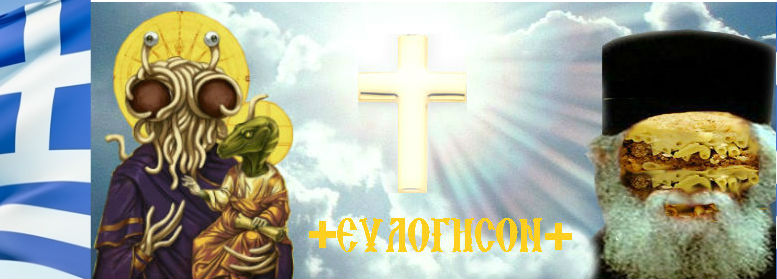

Published on 9 March 2017 in Uncategorized
Greece quashes charges in pasta-based “blasphemy” case
The man at the centre of the pasta-based Facebook “blasphemy” trial in Greece, has had his suspended 10-month prison sentence quashed in the appeals court.
However, the conviction was quashed only due to an administrative process aimed at clearing out “misdemeanor” crimes that had taken too long to process. The court reportedly activated article 8 of law 4411/2016 which cancels misdemeanors committed up until March 31, 2016.

An image from the Elder Pastisios Facebook page, for which one Greek man has suffered years in the courts under “blasphemy” laws
Philippos Louizos was convicted in January 2014 and handed a suspended sentence of ten months for making Facebook posts in which he depicted a revered Orthodox monk, Elder Paisios, with pasta for a face, thus making a pun on his name, and borrowing imagery from the satirical Church of the Flying Spaghetti Monster. He had given the pasta-faced satirical figure the name “Elder Pastitsios”. Pastitsio is a local dish made from pasta and béchamel sauce.
Louizos’ initial arrest in 2012 was reportedly linked to pressure by the Greek neo-Nazi Golden Dawn party.
The Humanist Union of Greece (HUG) comments: “The quashing of blasphemy charges against Philippos Louizos because of the conditional prescription of all small crimes to alleviate the work of overburdened Greek courts ended his judicial harassment on 2 March 2017. Philippos and the Humanist Union of Greece that offered him free legal aid are not satisfied though as he was not given a chance to be acquitted on the merits during the appeals trial.”
There was a concerted effort by humanists in Greece and internationally to abolish the Greek ‘blasphemy’ laws, writing to government officials in June last year and again early last month.
HUG comments: “They also regret that the international campaign by humanist organizations in 2016 and the UN CERD recommendations in August 2016 that Greece abolishes the effectively discriminatory Articles 198 and 199 of the Criminal Code criminalizing blasphemy did not lead to the abolition of the charges before the trial, despite repeated Greek government pledges before three UN bodies and through public statements that they would have done so.
“Once more, the supposedly progressive SYRIZA-led government gave in to the aggressive public opposition of Greek Orthodox bishops. On the contrary, Hellenic Police reports frequent arrests and fresh charges for blasphemy, the most recent in December 2016 and January 2017. The campaign to end blasphemy laws in Greece will now take new forms including before the domestic courts.”
The Greek “blasphemy” law remains on statute.